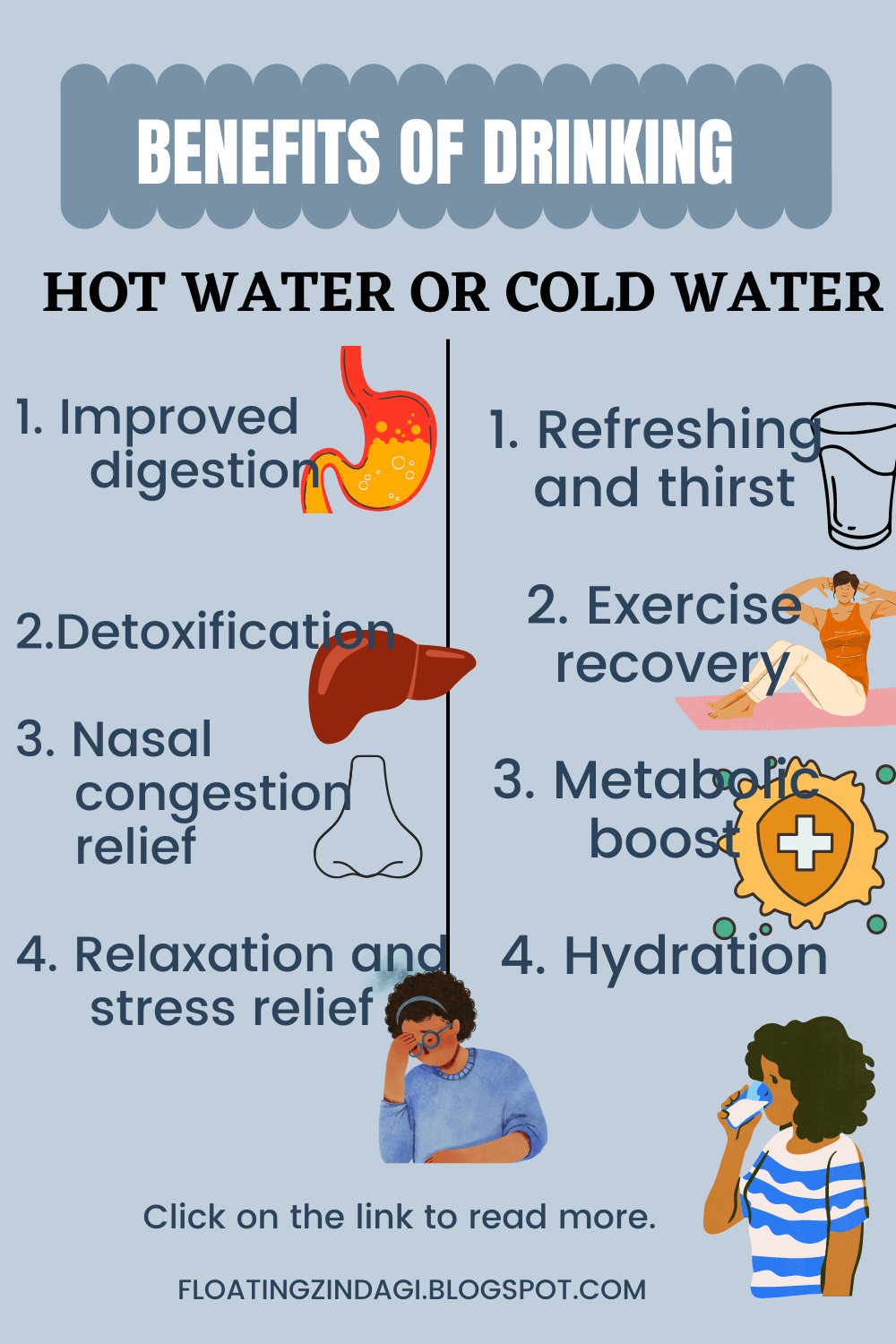Introduction:
Water is essential for our daily lives, serving as a vital resource for hydration, hygiene, and overall well-being. However, when it comes to drinking and bathing, the temperature of the water can significantly impact our experiences and even affect our health. The debate between hot and cold water as the preferred choice for drinking and bathing has been ongoing, with advocates on both sides presenting their arguments. In this article, we will explore the benefits and drawbacks of hot and cold water for drinking and bathing, shedding light on which option may be more suitable in different circumstances.
Drinking Hot or Cold?
Advantages of Drinking Hot Water:
1. Improved digestion:
Hot water can help in good digestion and also stimulate the digestive system.
It aids in the breakdown of food and can alleviate digestive discomfort such as bloating, gas, and constipation.
Also read 18 Common Health Myths With Their Facts.
2. Detoxification:
Drinking hot water can promote detoxification by increasing body temperature and inducing sweating. This process helps eliminate toxins from the body and supports overall detoxification processes.
3. Nasal and throat congestion relief:
Inhaling steam from hot water can provide temporary relief from nasal congestion, sinus pressure, and throat irritation. The warmth and moisture can help soothe the respiratory system and promote easier breathing.
4. Relaxation and stress relief:
Sipping on a warm cup of water can have a calming and soothing effect on the body and mind. It can help reduce stress, promote relaxation, and provide comfort.
5. Blood circulation:
Hot water consumption may help improve blood circulation by expanding blood vessels and promoting better blood flow.
6. Pain relief:
Hot water can provide relief from certain types of pain, such as menstrual cramps or muscle aches. The warmth can help relax muscles, reduce inflammation, and alleviate discomfort.
Also read 13 vitamins and their benefits
7. Hydration:
While both hot and cold water contribute to hydration, some individuals find it easier to consume larger quantities of hot water, leading to better overall hydration.
Disadvantages of Drinking Hot Water:
1. Risk of burns: p
Hot water can cause burns or scalds if consumed too quickly or at very high temperatures. It's important to let hot water cool down to a safe drinking temperature before consuming it to avoid the risk of burns to the mouth, throat, or digestive system.
2. Dehydration risk:
While hot water can be soothing, excessive consumption of hot beverages may have a diuretic effect. This means that it can increase urine production and potentially contribute to dehydration if not balanced with an adequate intake of fluids.
3. Nutrient loss:
Prolonged exposure to heat can cause certain water-soluble vitamins and minerals to break down, resulting in potential nutrient loss. However, the impact on nutrient loss is generally minimal unless the water is heated for an extended period or boiled excessively.
4. Impact on dental health:
Drinking very hot water frequently or for prolonged periods may potentially affect dental health. It can contribute to enamel erosion and increase tooth sensitivity over time. It's advisable to let hot water cool down to a moderate temperature before consuming to minimize any adverse effects on dental health.
5. Discomfort or digestive issues:
Hot water can sometimes cause discomfort or digestive issues in some individuals. It may contribute to feelings of bloating, especially if consumed in large quantities or on an empty stomach. Some people may also experience mild gastrointestinal distress or heartburn after consuming hot water.
When consumed in moderation and at a safe temperature, hot water is generally considered safe and can provide various health benefits. As always, it's recommended to listen to your body's cues and make choices that suit your individual needs and preferences.
Bathing With Hot Or Cold?
Advantages of Bathing with Cold Water:
1. Refreshing and invigorating:
Cold water can provide an instant burst of freshness, awakening the senses and leaving you feeling energized.
Also read Food combination to avoid
2. Reduced inflammation and swelling:
Cold water can help constrict blood vessels, which can reduce inflammation, swelling, and redness. It can be particularly beneficial for muscle recovery after intense physical activity.
3. Improved circulation:
Cold water immersion can stimulate blood flow and circulation, enhancing overall cardiovascular health.
4. Improved mood and mental alertness:
Cold water exposure triggers the release of endorphins, which can improve mood and mental clarity.
Disadvantages of Bathing with Cold Water:
1. Discomfort:
Cold water baths can initially cause discomfort, especially if the temperature is extremely cold. It may take time for the body to adjust to the cold sensation.
Also read 10 Best plants to purify indoor air.
2. Constriction of pores:
Cold water can temporarily constrict the pores, making it more challenging to cleanse the skin effectively.
3. Limited relaxation benefits:
Cold water may not provide the same level of relaxation and stress relief as hot water.
It's important to find a bathing temperature that is comfortable for you and suits your individual preferences. Additionally, individuals with certain medical conditions or sensitivities should consult with a healthcare professional for guidance on the most suitable bathing practices.
Also read Bedtime habits to avoid.
Conclusion:
In conclusion, the choice between hot and cold water for drinking and bathing ultimately depends on personal preferences, individual needs, and specific situations. Both hot and cold water have their own advantages and disadvantages, and the decision should be based on factors such as climate, health considerations, and the desired effect.
Ultimately, striking a balance between hot and cold water usage is often the best approach. It is recommended to consider individual preferences, seek medical advice if necessary, and adapt to different circumstances accordingly. Moreover, maintaining proper hydration is crucial regardless of the temperature of the water, as it plays a vital role in supporting overall health and well-being.







0 Comments